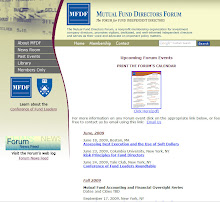At a May 14, 2009 open meeting of the Commission, the SEC proposed for comment rules "intended to ensure that investment advisers who have 'custody'” of clients’ funds and securities are handling those assets properly. The Madoff and Stanford ponzi schemes have demonstrated that there is great potential for harmful abuse by investment advisers misusing investors' funds, and concealing their activities using phony account statements showing the activities of bogus funds.
One key aspect of these new rule proposals is a requirement that investment advisers have an annual "surprise exam" by an independent accounting firm. To help prevent advisers from rigging their own "surprise" by a friendly or unqualified accountant, in the case of advisers or affiliates of the adviser holding clients' assets directly, the "surprise exam" would have to be conducted by a PCAOB-registered and inspected accountant.
Another aspect of these proposals would apply to investment advisers whose client assets are not held or controlled by a firm independent of the adviser, requiring them to obtain a written report prepared by a PCAOB-registered and inspected accountant that, "among other things, describes the controls in place, tests the operating effectiveness of those controls, and provides the results of those tests" (i.e., their SAS-70 reports).
In addition to these "surprise exam" provisions, the proposed amendments also would require that custodians holding the assets of advisory clients deliver the custodial statements directly to the individual advisory clients rather than sending them through the investment adviser. Advisory clients would be encouraged to compare the statements they receive from the adviser with those they obtain from the custodian, making it more difficult for an adviser to prepare false account statements, and making it possible for clients to find discrepancies.
According to SEC Chairman Mary L. Schapiro, “These new safeguards are designed to decrease the likelihood that an investment adviser could misappropriate a client’s assets and go undetected. That’s because an independent public accountant will be looking over their shoulder on at least an annual basis.” The goals of these proposed rules are to promote independent custody, enable independent public accountants to act as third-party monitors, alert the SEC staff and investors to potential problems at an adviser, and provide the Commission with important information for risk assessment purposes.
The full text of the SEC's press release announcing these rule proposals is available at: http://sec.gov/news/press/2009/2009-109.htm
The text of the rule proposal is expected to be posted on the SEC's website in upcoming weeks.
skip to main |
skip to sidebar
About Forum News Feed
Forum News Feed, a publication of the Mutual Fund Directors Forum, is an electronic journal of news and resources for fund independent directors. For more information about the Forum, please visit our website at http://www.mfdf.com/ or send us a message by clicking this link.
Search Forum News Feed
Subscribe via email
If you would like to be alerted by email of new posts on Forum News Feed, sign up using this link:
Subscribe to Forum News Feed by Email
Kindle Edition
Post Archive
Web Feeds and Other Resources
-
-
-
-
-
-
Baidu Still a Buy6 years ago
-
Tue, 17 Dec 2013, issue12 years ago
-
-
-
-
-
Links to Regulators
Disclaimer
This Web page provides links to resources on certain topics that the Forum feels mutual fund directors and others in the mutual fund industry may find of interest. Some of the links on this page are to documents and Web pages of other organizations.
The linked content provided on this site is for informational purposes only, and the content's maintenance and accuracy is the responsibility of their respective authors or owners, and not the responsibility of the Mutual Fund Directors Forum. The information linked on this page does not constitute legal advice. Before you make any decision that may have legal implications, you should consult with a qualified legal professional for specific legal advice tailored to your situation.
The linked content provided on this site is for informational purposes only, and the content's maintenance and accuracy is the responsibility of their respective authors or owners, and not the responsibility of the Mutual Fund Directors Forum. The information linked on this page does not constitute legal advice. Before you make any decision that may have legal implications, you should consult with a qualified legal professional for specific legal advice tailored to your situation.





